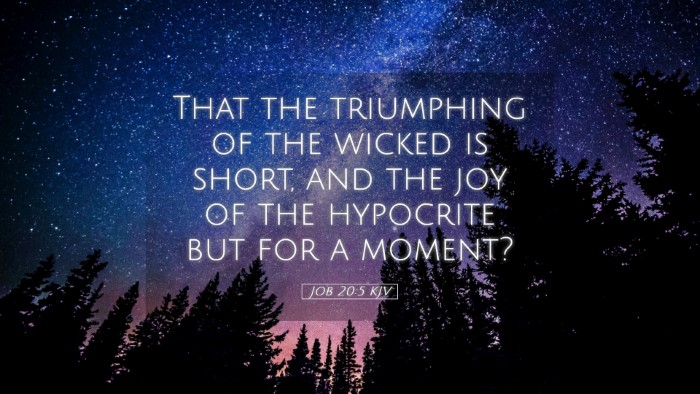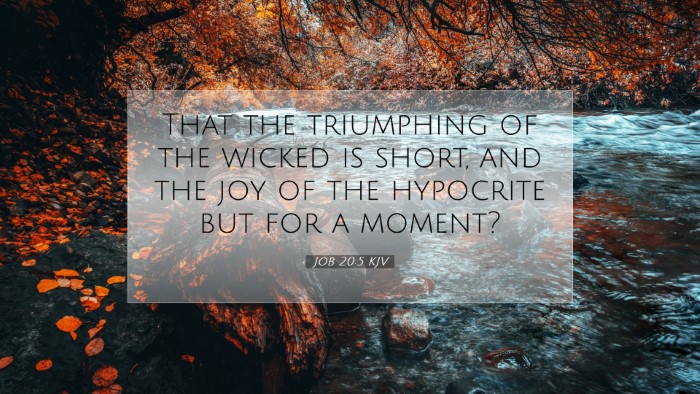Old Testament
Genesis Exodus Leviticus Numbers Deuteronomy Joshua Judges Ruth 1 Samuel 2 Samuel 1 Kings 2 Kings 1 Chronicles 2 Chronicles Ezra Nehemiah Esther Job Psalms Proverbs Ecclesiastes Song of Solomon Isaiah Jeremiah Lamentations Ezekiel Daniel Hosea Joel Amos Obadiah Jonah Micah Nahum Habakkuk Zephaniah Haggai Zechariah MalachiJob 20:5
Job 20:5 KJV
That the triumphing of the wicked is short, and the joy of the hypocrite but for a moment?
Job 20:5 Bible Commentary
Commentary on Job 20:5
Verse Context: Job 20:5 states, "That the triumphing of the wicked is short, and the joy of the hypocrite but for a moment." This verse appears in the context of Zophar's response to Job, as a part of the third round of dialogues in the Book of Job, wherein Zophar emphasizes the temporary nature of the wicked's prosperity.
Overview of Job 20
Authoritative Insights: The commentary on this chapter reflects on the nature of divine justice and the moral order of the universe, with Zophar's speech focusing on the fate of the wicked contrasted against the suffering of the righteous.
Commentary Excerpts
Insight from Matthew Henry
Matthew Henry points out that the essence of Zophar's message is the brevity of the wicked's pleasure. He asserts that the eminent triumphs of the wicked often appear to be dominant but will eventually lead to inevitable downfall.
- Unstable Joy: Henry highlights that the joy of the hypocrite is fleeting and ultimately unfulfilled, being likened to the vapor that quickly vanishes.
- Divine Retribution: He emphasizes God's justice, explaining that even when it seems the wicked prosper, their end shall not be prosperous eternally.
- Moral Order: The commentary reveals the moral order established by God, where the seeming triumph of sin will not govern the long term, rather it’s a temporary illusion.
Insights from Albert Barnes
Albert Barnes elaborates on the transient nature of worldly joy and the fate of those who engage in hypocrisy. His commentary presents these key concepts:
- Temporal vs. Eternal: Barnes denotes that the apparent joy of the wicked is confined to this life, while the righteous look forward to eternal rewards.
- Nature of Hypocrisy: The hypocrite's joy comes from deceit rather than sincerity, ultimately leaving them empty before God.
- Encouragement for the Faithful: This passage serves as encouragement to the faithful in their suffering, assuring them that the prosperity of the wicked is short-lived and will not justify their actions before God.
Reflections from Adam Clarke
Adam Clarke emphasizes the text's historical and theological implications, offering a series of reflections on the wicked's plight:
- Existential Understanding: Clarke notes that truly understanding the nature of joy in a life of sin leads to deeper insight into the weight of spiritual realities.
- The Role of Providence: God's providence, according to Clarke, balances the scales, ensuring that while sinners may flourish temporarily, their ultimate fate is fixed and resolute.
- Hope for Believers: His reflections reinforce hope for believers, illustrating that while they may endure trials, the Lord’s justice will ultimately prevail.
Theological Implications
Job 20:5 speaks to the heart of theological discussions surrounding justice, suffering, and the nature of evil. It provides a framework for understanding the complexities of God's governance over the world.
- Justice of God: The commentary asserts that God's justice cannot be thwarted by human actions; thus, the suffering of the righteous serves a greater purpose in divine chronology.
- Temporal Provisions: It challenges the believer to view worldly success and joy through the lens of eternity, stressing that present circumstances do not reflect ultimate reality.
Conclusion
In conclusion, Job 20:5 offers profound insights into the nature of wickedness and the transient joy it purportedly brings. The combined wisdom from Henry, Barnes, and Clarke results in a valuable commentary that is applicable for pastors, theologians, and students. It serves as a reminder of the steadfast nature of God's justice and encourages believers to remain vigilant and faithful amid tribulations, trusting in the eventual triumph of righteousness over wickedness.


